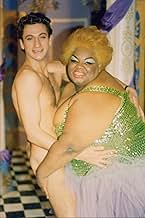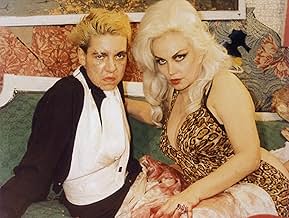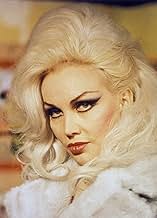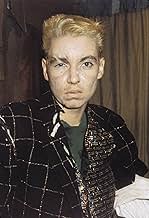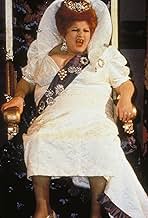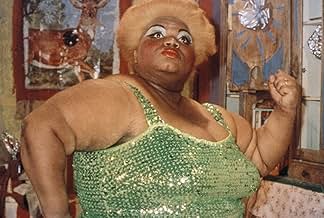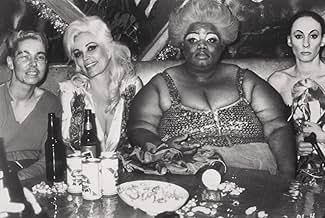NOTE IMDb
7,0/10
6,4 k
MA NOTE
Ajouter une intrigue dans votre langueA neurotic society woman murders her husband with her maid's help; on the lam, they escape to Mortville, a homeless community ruled by a fascist queen.A neurotic society woman murders her husband with her maid's help; on the lam, they escape to Mortville, a homeless community ruled by a fascist queen.A neurotic society woman murders her husband with her maid's help; on the lam, they escape to Mortville, a homeless community ruled by a fascist queen.
- Réalisation
- Scénario
- Casting principal
Brook Yeaton
- Bosley Jr.
- (as Brook Blake)
Avis à la une
All of John Waters' early films, beyond being purposefully shocking and repulsive, have this really tangible dirty, raunchy quality to them. They're movies with bad hygiene, like the porno movies whose actors have dirt under their fingernails or pimples in all the wrong places. Waters has a special gift for compiling the most disgusting items and the most disgusting combinations of items (lesbian glory holes, marshmallows and Cheez-its, egg-addicted 250-lb women, bleeding gums and French kissing, 'Surfin' Bird' and anal lip-syncing) for maximum effect, filming everything in grainy, artless 16mm with alternately wooden and over-the-top line-readings not dissimilar to the acting in a porno flick.
If you've seen Waters on television, he has a certain sophisticated charm to his wit, and perhaps a dirtier director wouldn't have the right sensibility to make films as authentically dirty as this one, or the discretion enough to choose performers as dirty-looking as Turkey Joe and Kenny Orye. The fact that Waters does not show any contempt or opinion about his subjects is important. He has this open, accepting non-judgmental affection for everyone in his films that makes the films themselves OF the filth they are depicting rather than simply about that filth, and he embraces those of notoriety and dubious character such as Patty Hearst and Liz Renay. He's subversive not by philosophy or decision, but by nature. Subversiveness for Waters means a good time. What distinguishes his work as "underground" rather than "exploitation" is that he celebrates the depravity and freakishness of his performers rather than exploiting.
Every single character in 'Desperate Living' is a sociopath, as it takes place primarily in a fairy-tale town called Mortville, to which housewife Peggy Gravel (Mike Stole) and her 300-lb black maid Grizelda (Jean Hill) flee after the latter murders Stole's husband by sitting on his face. Everyone in Mortville is trashy and, well, desperate, and there's a vivid pre-punk vibe here amongst psycho-dyke Mole, played by Susan Lowe, and others, and in the garish, tacky colors of the town's decor, which Waters reports was constructed entirely out of garbage with only one exception.
While I find Waters' 'Pink Flamingos' boring once the shocks become familiar, 'Desperate Living' is a fascinating movie to watch. It's probably Waters' most depraved and outrageous movie, and the funniest of his pre-'Polyester' movies. You get to see the hefty Jean Hill naked, rolling around in bed with Mink Stole, and you get to see Waters regular Edith Massey in all her snaggletoothed wonder as the wicked Queen Carlotta, being pleasured by one of her many leather-clad man-servants. You'll see this and, if nothing else, probably want to catalogue these bits to friends or show them the film, just to get a rise out of them.
If you've seen Waters on television, he has a certain sophisticated charm to his wit, and perhaps a dirtier director wouldn't have the right sensibility to make films as authentically dirty as this one, or the discretion enough to choose performers as dirty-looking as Turkey Joe and Kenny Orye. The fact that Waters does not show any contempt or opinion about his subjects is important. He has this open, accepting non-judgmental affection for everyone in his films that makes the films themselves OF the filth they are depicting rather than simply about that filth, and he embraces those of notoriety and dubious character such as Patty Hearst and Liz Renay. He's subversive not by philosophy or decision, but by nature. Subversiveness for Waters means a good time. What distinguishes his work as "underground" rather than "exploitation" is that he celebrates the depravity and freakishness of his performers rather than exploiting.
Every single character in 'Desperate Living' is a sociopath, as it takes place primarily in a fairy-tale town called Mortville, to which housewife Peggy Gravel (Mike Stole) and her 300-lb black maid Grizelda (Jean Hill) flee after the latter murders Stole's husband by sitting on his face. Everyone in Mortville is trashy and, well, desperate, and there's a vivid pre-punk vibe here amongst psycho-dyke Mole, played by Susan Lowe, and others, and in the garish, tacky colors of the town's decor, which Waters reports was constructed entirely out of garbage with only one exception.
While I find Waters' 'Pink Flamingos' boring once the shocks become familiar, 'Desperate Living' is a fascinating movie to watch. It's probably Waters' most depraved and outrageous movie, and the funniest of his pre-'Polyester' movies. You get to see the hefty Jean Hill naked, rolling around in bed with Mink Stole, and you get to see Waters regular Edith Massey in all her snaggletoothed wonder as the wicked Queen Carlotta, being pleasured by one of her many leather-clad man-servants. You'll see this and, if nothing else, probably want to catalogue these bits to friends or show them the film, just to get a rise out of them.
A film that embodies the youthful energy of a teenage class clown who just wants to shock the world with whatever over the top antics they can get away with. It's a relentless blitzkrieg of absurd obscenity. After awhile, you start to grow desensitized to the filth as you are bombarded with one insane scenario after another, but I guess that's kinda the point of it all. Later day John Waters does attempt to put some method to the madness, but this is him at his most unfiltered.
DESPERATE LIVING is something of a transitional film for director Waters. It is a departure from his earlier works because it was the first of his films not to be produced by his Dreamland company, but by a limited partnership called Charm City Productions. It was also the first feature he made without his usual star, Divine, and therefore represents a departure from his usual story lines (which had previously served as vehicles for Divine). In this sense, it is a film that is more Waters' vision. The story and the execution of the film is far too grim, however. Waters' films work because the characters seem to enjoy themselves very much. But DESPERATE LIVING presents us with characters that simply seem miserable, and nothing else. The opening scenes are quite funny, though. Jean Hill's performance is particularly funny. From a moviegoers' standpoint, I prefer FEMALE TROUBLE highly over this film. I am somewhat baffled at the statement that DESPERATE LIVING is Waters' best film. I can see that it is his most technically advanced up to the time it was made, but surely FEMALE TROUBLE contains the funniest dialogue and performances. All in all, DESPERATE LIVING represents a pre-mainstream John Waters which is always an interesting experience. However, I would not reccomend it as highly as I would some of his other works.
John Waters never apologizes for his movies- and this one is both funny and disgusting. Mink Stole as the hysteric and Miss Edie as the queen are both off the wall good. Waters doesn't shy away from nudity- both male and female-- but it all works to make this a hilarious spoof.
"Desperate Living" and "Female Trouble" are Waters' best films, fully realized trash epics with great characters, gorgeous production design and an unapologetic affection for trailer trash values.
The story is simple. Peggy Gravel (Mink Stole), a neurotic suburban snob, flees to Mortville, the town where criminals live scot-free, after her obese maid, Grizelda Brown (Jean Hill), sits on and squashes her sermonizing husband, Bosley Gravel (the great George Stover). The women share a bed in Mortville under the roof of a disgusting hovel run by Mole McHenry (Susan Lowe), a snot-dispensing, pre-op transsexual with impeccable table manners and a luscious lesbian lover Muffy St. Jacques (Liz Renay). But the living arrangements prove less than harmonious and the entire place is trashed when the women offer refuge to Princess Coo-Coo (Mary Vivian Pearce), the downtrodden offspring of the domineering, boy-crazy Queen of Mortville (Edith Massey), who objects to her daughter's hippy-fied lifestyle. Complications ensue once the sycophantic Peggy worms her way into the Queen's chamber (and confidence) and a groundswell of support for a revolution intensifies.
The set-up of "Desperate Living" is pure magic. The idea of there being a town where miscreants can live scot-free is brilliant, as is Waters' enthusiastic take on the entire thing. The tone is that of a fairytale painted with snot and mucus and every detail is consistent in its intention to make you want to puke. The sight of Mary Vivean Pearce doing the town with rabies is a green, grotesque delight, as is the scene in which Mole's new penis is severed, then roughly sewn back on.
This is an unforgettable freak show from the puke-loving pope of popular culture.
You'd be a misfit to miss it.
The story is simple. Peggy Gravel (Mink Stole), a neurotic suburban snob, flees to Mortville, the town where criminals live scot-free, after her obese maid, Grizelda Brown (Jean Hill), sits on and squashes her sermonizing husband, Bosley Gravel (the great George Stover). The women share a bed in Mortville under the roof of a disgusting hovel run by Mole McHenry (Susan Lowe), a snot-dispensing, pre-op transsexual with impeccable table manners and a luscious lesbian lover Muffy St. Jacques (Liz Renay). But the living arrangements prove less than harmonious and the entire place is trashed when the women offer refuge to Princess Coo-Coo (Mary Vivian Pearce), the downtrodden offspring of the domineering, boy-crazy Queen of Mortville (Edith Massey), who objects to her daughter's hippy-fied lifestyle. Complications ensue once the sycophantic Peggy worms her way into the Queen's chamber (and confidence) and a groundswell of support for a revolution intensifies.
The set-up of "Desperate Living" is pure magic. The idea of there being a town where miscreants can live scot-free is brilliant, as is Waters' enthusiastic take on the entire thing. The tone is that of a fairytale painted with snot and mucus and every detail is consistent in its intention to make you want to puke. The sight of Mary Vivean Pearce doing the town with rabies is a green, grotesque delight, as is the scene in which Mole's new penis is severed, then roughly sewn back on.
This is an unforgettable freak show from the puke-loving pope of popular culture.
You'd be a misfit to miss it.
Le saviez-vous
- AnecdotesThe Mortville extras are mostly homeless people who were bussed in for the day. The crew had to work fast to get shots of them before they wandered off.
- GaffesWhen Mole first meets Peggy and Grizelda she tells them that there are no toilets in Mortville, but at the lesbian bar there are toilets, where Peggy is harassed by the 'bathroom pervert'.
- Citations
Peggy Gravel: Go home to your mother! Doesn't she ever watch you? Tell her this isn't some communist daycare center! Tell your mother I hate her! Tell your mother I hate you!
- Crédits fousDesperate Living's opening credits appear beside an overhead shot of a formal table setting, in which a maid serves a cooked rat as the main course, which is salted and eaten.
- Versions alternativesIn Italy, the film was heavily dubbed, censored, and retitled "Punk Story."
- ConnexionsFeatured in Divine Waters (1985)
Meilleurs choix
Connectez-vous pour évaluer et suivre la liste de favoris afin de recevoir des recommandations personnalisées
- How long is Desperate Living?Alimenté par Alexa
Détails
Box-office
- Budget
- 65 000 $US (estimé)
- Montant brut mondial
- 1 109 $US
Contribuer à cette page
Suggérer une modification ou ajouter du contenu manquant

Lacune principale
By what name was Desperate Living (1977) officially released in India in English?
Répondre
